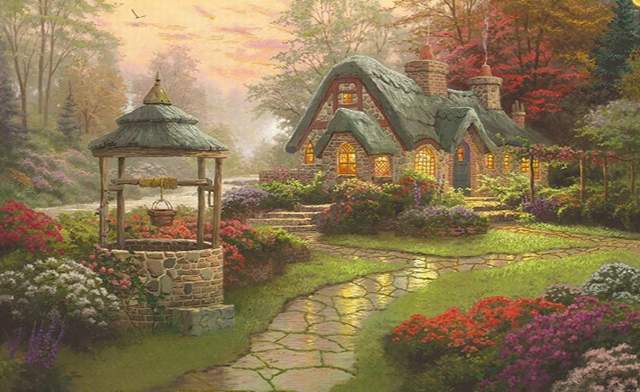Opinion/Editorial
A MOST NUCLEAR CHRISTMAS
Once upon a time not so long ago most of humanity lived in small groups, surrounded by numbers of other small groups. These enclaves were held together by bonds of blood. The people in the smaller groups, those directly tied by first blood relations (grandfather, grandmother, father, mother, and children) while those in congruent groups were of more distant blood (aunts, uncles, cousins, and nephews). These kinds of bands and bonds existed for thousands upon thousands of years. The reason for these close extended family ties was survival. Replacement and care for the wounded were the two primary causes of catastrophic failure of the family. By establishing and maintaining very close geographic ties the groups could immediately close ranks to supply needs services for someone passing on or provide comprehensive care for those hurt or disabled.
Thomas Kinkade was the most popular and best-selling artist on earth until his death earlier this year. His fame was built upon painting images of extended families living in distant outdoor settings where families clustered around one another with warm fires, comfy wooden cabins, and nearby rustling pines. Kinkade’s great success was based upon humanity’s genetic draw to a past long gone and never likely to be repeated.
Today, in first and second world countries, we live in nuclear family settings. Grandparents, aunts, uncles, cousins, and nephews are commonly located quite some distance away, many times hundreds or thousands of miles away. The extended necessities for clustered enclaves have come to be provided by advanced technology. Money provides liquidity for the loss of a breadwinner in the form of life insurance. Nursing homes provide long term care for the damaged or disabled. Extremely rapid and available travel allows distant relatives to rush ‘home’ for short periods. Advanced communications allow for frequent discussions and advice. The need for genetically linked humans to maintain closed ranks against the bitter reality of the earth’s harsher intentions has been met by what we have come to call civilization.
During the season of Christmas, more than any other, nuclear families make every effort to reach back and feel warm comfort from responding to deep genetic links. We bring the pine trees from Kinkade’s works right into our homes and light them up with that same warm light he so effectively painted. We gather extended family members by providing transportation, rooms, and grand meals. No matter what the differences within such groupings and never respecting the well-known fact that most such gatherings are not found to be socially comfortable by the majority, we continue to pull together almost each and every Christmas season.
The Christmas season, beginning with Thanksgiving preceding it, is neither an accidental nor unimportant holiday. It has become vital for our re-establishment of emotional meaning, trust, care, and love. We give presents to remind us of our bonds, to build new ones and to reward ourselves for having the good sense to care for others so that they may care for us in return. We did not drop from the trees, rise from the savannah, and take over this planet because we were so tough as individuals. We did it, and do it, because we need, care about, and love one another. We have become family. Our nuclear bonds have expanded to cover neighbors, friends, and co-workers. And our new model is working well.
With this model, constructed from technological creations subtly suited for the task (cell phones, iPads, laptops, iPods, airplanes, Facebook, YouTube and more), we fortify and assure our survival as we gather ourselves to civilize the universe and do so while always feeling that we are doing the right thing. There is only one assurance for surviving the loss of loved ones. The assurance takes us all the way back to understand our extended family roots. We must have the assurance of more loved ones to replace the ones we most certainly must lose if we are to live.
The pandemic only brought us closer together, at least in the developed western cultures, and the results of that have played hard and well, both at the same time with family, extended and nuclear, as well as with friends and pets. We, once again, grew closer while becoming afraid that being closer might also mean economic difficulties…physical survival posed next to or against psychological survival.
Christmas, the celebration of the birth of Christ, for many, a great fund gift-giving party time for others, gives a brief respite, while it is being celebrated, from a harder tougher reality just outside the door. Winter, for those who experience it, is a reminder that the world is a tough place, but also a place to love, enjoy and share. Christmas is coming, so get ready.







